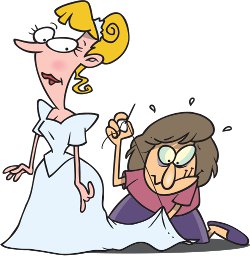
* HAVE or GET SOMETHING DONE is used when we don't do something for ourselves. That is to say, someone else does something for us.
E.g.:
I didn't type the report.
I had my report typed by my assistant.
I'm not going to fix my car.
I'm going to have my car fixed.
* Have something done is also called CAUSATIVE USE OF HAVE because the construction expresses the idea of someone causing something to take place. So, the most important thing here is the action: the person who does the action (agent or doer) is optional, unknown or unnecessary.
* HAVE and GET carry the same idea but GET is more informal.
* We can also use HAVE or GET SOMETHING DONE in situations where something negative happens and we don't have control over it (something bad happens to people or their possessions).
E.g.:
Kathy had a car accident last week. She had her car smashed in the accident.
* FORM

More examples:
- The living room in my new flat is a terrible salmon pink colour. I'm going to have it painted before I moved.
- I need to go to the dentist today to have a tooth pulled. I hope it's very fast!
- Will you have your party catered, or are you going to cook all food by yourself?
- Oriana had her dress sewn by a professional seamstress. She wanted it to look perfect for her prom.
* To see how the causative use of have changes according to the different verbal tenses, check the table below:
| TENSE | ACTIVE | CAUSATIVE FORM | |
| PRESENT SIMPLE | He makes Sushi. | He has Sushi made. | |
| -ING FORM | He loves making Sushi. | He loves having Sushi made. | |
| PRESENT CONTINUOUS | He is making Sushi. | He is having Sushi made. | |
| PAST SIMPLE | He made Sushi. | He had Sushi made. | |
| PAST CONTINUOUS | He was making Sushi. | He was having Sushi made. | |
| PRESENT PERFECT | He has made Sushi. | He has had Sushi made. | |
| PRESENT PERFECT CONTINUOUS | He has been making Sushi. | He has been having Sushi made. | |
| PAST PERFECT | He had made Sushi. | He had had Sushi made. | |
| PAST PERFECT CONTINUOUS | He had been making Sushi. | He had been having Sushi made. | |
| BE GOING TO | He is going to make Sushi. | He is going to have Sushi made. | |
| FUTURE SIMPLE | He will make Sushi. | He will have Sushi made. | |
| FUTURE CONTINUOUS | He will be making Sushi. | He will be having Sushi made. | |
| PRESENT CONDITIONAL | He would make Sushi. | He would have Sushi made. | |
| PRESENT CONDITIONAL CONTINUOUS | He would be making Sushi. | He would be having Sushi made. | |
| PRESENT PERFECT CONDITIONAL | He would have made Sushi. | He would have had Sushi made. | |
| MODALS & SEMI- MODALS | can | He can make Sushi. | He can have Sushi made. |
| could | He could make Sushi. | He could have Sushi made. | |
| must | He must make Sushi. | He must have Sushi made. | |
| should | He should make Sushi. | He should have Sushi made. | |
| ought to | He ought to make Sushi. | He ought to have Sushi made. | |
| may | He may make Sushi. | He may have Sushi made. | |
| might | He might make Sushi. | He might have Sushi made. | |
| will | He will make Sushi. | He will have Sushi made. | |
| have /has to | He has to make Sushi. | He has to have Sushi made. | |
| have / has got to | He has got to make Sushi. | He has got to have Sushi made. | |
| needs to | He needs to make Sushi. | He needs to have Sushi made. | |
| needn’t | He needn’t make Sushi. | He needn’t have Sushi made. | |
| had better | He had better make Sushi. | He had better have Sushi made. | |
| used to | He used to make Sushi. | He used to have Sushi made. | |
| MODAL PERFECT | can’t have | He can’t have made Sushi. | He can’t have had Sushi made. |
| could have | He could have made Sushi. | He could have had Sushi made | |
| must have | He must have made Sushi. | He must have had Sushi made. | |
| should have | He should have made Sushi. | He should have had Sushi made. | |
| may have | He may have make Sushi. | He may have had Sushi made. | |
| might have | He might have made Sushi. | He might have had Sushi made. | |
| will have | He will have made Sushi. | He will have had Sushi made. | |
Just in case you need more explanation to clarify the causative use of have, you'll find embedded below two Power Points Presentations that I got from the Web.
Have something done from Maria Hidalgo
Have something done from David Mainwood
And now...

Click on the links above to practise for our test!!
Exercise 1
Exercise 2
Exercise 3
Exercise 4
Exercise 5
And now...

Click on the links above to practise for our test!!
Exercise 1
Exercise 2
Exercise 3
Exercise 4
Exercise 5





_poster.jpg/220px-For_the_Birds_(film)_poster.jpg)





